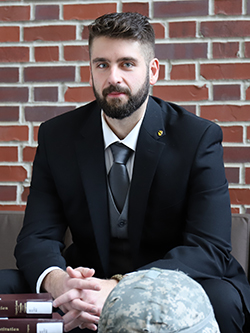Ryan Rehberg, '19, among select few chosen for the prestigious VFW-SVA Legislative Fellowship
UND Law student keeps military connections alive by making a difference on Capitol Hill for veterans

When veterans visit the E.R., they sometimes have to pay the entire bill themselves, even if they’re eligible to be reimbursed.
Ryan Rehberg wants to change that.
The UND Law student has been named a legislative fellow by the VFW (Veterans of Foreign Wars) and will advocate for veterans on Capitol Hill in March.
It’s a big deal.
Rehberg’s proposal on emergency room policy resulted in being one of just 10 in the nation chosen for the prestigious VFW-SVA Legislative Fellowship next semester.
Rehberg will fly to Washington, D.C., in March to meet with federal legislators and officials to advocate improving VA policy. The fellowship involves research, reporting and advocating for veterans issues, and taking action in the local community.
Rehberg, a second-year law student, is a U.S. Army Infantry veteran who served 12 months in Iraq
“The military had such a profound impact on my life,” said Rehberg, who grew up near Green Bay, Wis., and has an undergraduate degree in communication with an emphasis in conflict resolution. “I didn’t want to leave it behind, and this is an opportunity to keep that connection.”
Voicing concern
Rehberg is advocating a simple but important change: to extend the 72-hour time limit requiring a veteran to report a service-related emergency room visit to the Department of Veterans Affairs (VA).
“When veterans need to visit the E.R., the nearest VA facility may be miles away,” Rehberg said. “They can go to a non-VA facility, but have to report it within 72 hours or they have to pay the entire cost. Reporting becomes more complicated when the veteran is incapacitated or in a coma, and must rely on friends or family to notify the VA. Extending that deadline could relieve pressure on veterans and their families, and let them recover.”
Rehberg spent months researching the issue, speaking to fellow veterans, visiting with veteran affairs offices, and figuring out how to implement his plan.
“I was surprised how prominent this issue is,” said Rehberg. “My experience with the VA has been good, but areas with higher populations can have more problems. In my experience, the North Dakota and Wisconsin VAs go above and beyond.”
After he returns from Washington, Rehberg will implement a community action plan and continue meeting with veterans and lawmakers as part of the fellowship. The experience will last all of next semester.
“This doesn’t stop with D.C.,” he said. “I will take what I learned and apply it to the local community.”
Legal connections
Rehberg credits the School of Law, faculty and staff for helping him with the research and applying for the fellowship.
“Anne Mostad-Jensen (head of faculty services) at the Law Library helped me with the research and helped me find context,” Rehberg said. “Brad Parrish (assistant dean for student life) gave me the opportunity, and Julia Ernst provided feedback.”
“When Ryan told me about his interest in applying for the fellowship, I was thrilled he asked for my input,” said Ernst, an associate professor of law who teaches a legislation seminar based on her experience working inside Congress and with a legal advocacy organization on Capitol Hill. “Ryan’s proposal to improve health services provided to veterans clearly resonated with the VFW members who selected the winners of the legislative fellowship.”
Ernst requires her students to research, write and present a major legal advocacy paper, and Rehberg presented a proposal on another military-related issue to the class. This experience will help him present his fellowship proposal to members of Congress this spring, she said.
“In a very polished address, Ryan presented his briefing paper during a simulated hearing of the U.S. Senate Committee on Armed Services,” said Ernst. “During the question-and-answer period, one of his colleagues asked about his lapel pin, which signified his service in the U.S. Army, and she thanked him for his service.”
Rehberg will receive academic credit for his work as part of the School of Law’s experiential learning requirement.
“This was not work,” he said about balancing law school and applying for the fellowship in addition to working on earning his aviation certificate from UND Aerospace. “I looked forward to it and enjoyed it. This was my fun, my getaway, to craft an idea and help people at the same time.”
“An opportunity like this can help me decide what I want to do [when I graduate],” he said. “This is part of law school – to experience different parts of the law and see where I best fit.”
by Jan Orvik